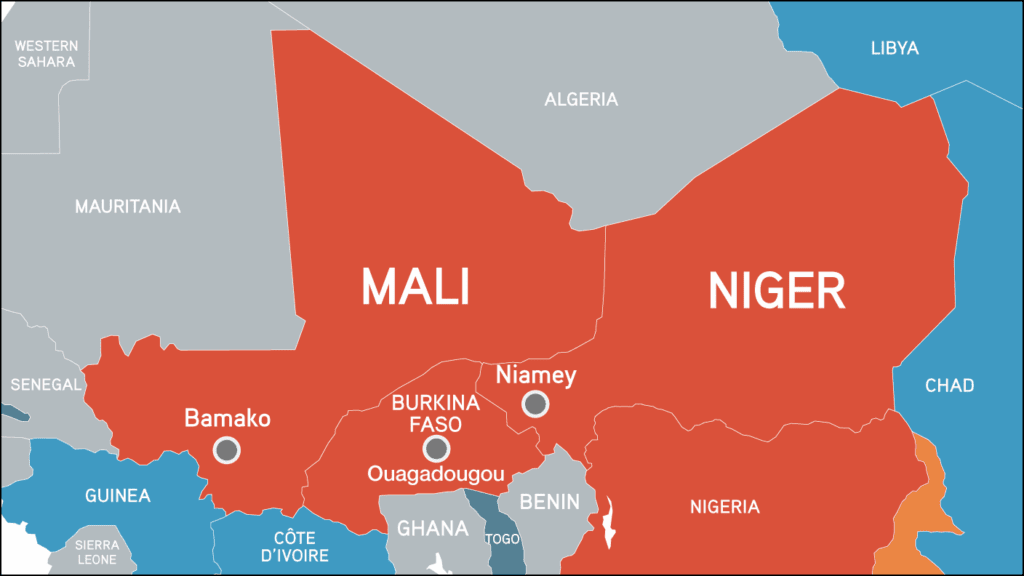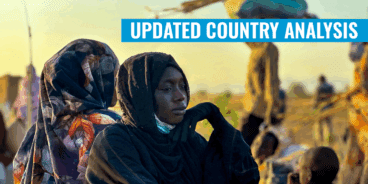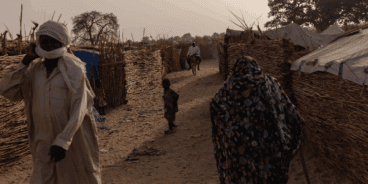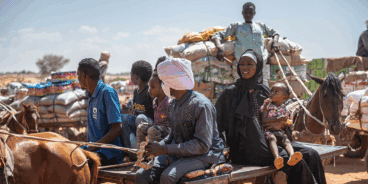Central Sahel (Burkina Faso, Mali and Niger)

Recurrent and expanding violence perpetrated by armed Islamist groups, as well as security operations to confront them, threaten populations in the Central Sahel – Burkina Faso, Mali and Niger – with violations that likely amount to crimes against humanity and war crimes.
BACKGROUND:
Populations in the Central Sahel – Burkina Faso, Mali and Niger – are enduring armed conflict and inter-communal violence amidst an entrenched insurgency driven by armed Islamist groups affiliated with al-Qaeda (JNIM) and the so-called Islamic State Sahel Province (ISSP). Violence has also taken place between rival ethnic militias and community-based self-defense groups resulting in reprisal attacks and countless abuses.
Armed Islamist groups perpetrate recurrent abuses and attacks against civilians. These groups systematically use sieges, threats, kidnappings, improvised explosive devices (IEDs), drones and landmines as deliberate tactics of war as they seek to control supply routes and increase areas of influence. They have also enforced their own interpretation of Sharia law in areas under their control, imposing severe gender discriminatory rules. In besieged areas, armed Islamist groups are blocking humanitarian aid to civilians and causing starvation, imposing forced taxation and strategically destroying and looting civilian objects, including places of worship, health centers, food reserves and water services, among other violations of International Humanitarian Law (IHL). Insurgents also routinely perpetrate grave violations against children and target secular state education, burning schools and threatening, abducting or killing teachers.
Counterterrorism operations have often led to human rights violations in all three states, with security forces in Mali and Burkina Faso implicated in likely war crimes and crimes against humanity. The Malian Armed Forces (FAMa) and Russian state-controlled Africa Corps (formerly the Wagner Group) have perpetrated possible war crimes and crimes against humanity, including summary executions, indiscriminate airstrikes, rape and sexual violence, pillaging and torture against civilians, among other abuses. State-sponsored militias in Burkina Faso, notably the Volunteers for the Defense of the Homeland (VDP), have also been implicated in grave crimes along ethnic lines.
The insurgency in the Central Sahel has its origins in the 2012-2013 armed conflict in northern Mali, during which populations endured atrocity crimes. The International Criminal Court (ICC) subsequently issued an arrest warrant for Iyad Ag Ghaly, the head of the armed Islamist group Ansar Dine, for war crimes and crimes against humanity. The ICC has convicted Al Hassan Ag Abdoul Aziz, a senior member of the Islamic Police of Timbuktu and Ansar Dine, of war crimes and crimes against humanity, while Ahmad al-Faqi al-Mahdi was convicted of war crimes for the intentional destruction of cultural sites. Accountability remains limited with few alleged perpetrators having been arrested, prosecuted or tried for international crimes.
The region has faced significant political and security upheaval since 2020, including military takeovers in all three countries. The military regimes have taken several measures to repress civic and political space and reduce international scrutiny into the country’s human rights situations. Dozens of journalists, human rights defenders and others have faced arbitrary detention, enforced disappearances and unlawful forced military conscription in Burkina Faso, Mali and Niger. The three military regimes created the Alliance of Sahel States in 2023 and formally withdrew from the Economic Community of West African States in January 2025. In September the African Union Peace and Security Council called for enhanced collective security approaches and established a “Task Force” to support Sahelian countries in countering terrorism and addressing broader security, socio-economic and humanitarian challenges.
RECENT DEVELOPMENTS:
The security and protection situation across Burkina Faso, Mali and Niger deteriorated sharply in recent months. According to the UN Office for the Coordination of Humanitarian Affairs, 2,976 security incidents resulting in 7,900 deaths were recorded between January and August.
In Mali, the UN Human Rights Office has documented hundreds of extrajudicial executions, arbitrary arrests and detentions and enforced disappearances by all parties this year alone. The UN Protection Cluster verified 13,987 human rights violations between April and June, more than double the previous quarter, with a marked increase in prolonged blockades, kidnappings, mass displacement and incidents involving IEDs. Notably, violence has recently spread to the southwest, while populations in Timbuktu, Gao, Mopti and Ménaka continue to face recurrent attacks. Since September JNIM has attacked hundreds of fuel tankers and abducted or assaulted fuel truck drivers, disrupting access to essential supplies, heightening tensions and worsening the humanitarian conditions. On 9 November the Chairperson of the African Union Commission expressed deep concern over the “rapidly deteriorating situation” in Mali.
Southwest Niger’s Tillabéri region has faced recurrent attacks by armed groups since March. According to Human Rights Watch, in at least five attacks, ISSP summarily executed over 127 villagers and Muslim worshipers and burned and looted dozens of homes. Amid the spike in attacks, the Nigerien military has stepped up counterinsurgency operations, which at times have resulted in civilian harm. Around 40 civilians were killed in an army airstrike during September. In October a series of armed group attacks in Tahoua led to civilian casualties and the suspension of humanitarian activities. These attacks heightened inter-communal tensions, with ethnic groups accusing each other of collusion with the armed groups.
In August Burkinabè authorities declared the UN Resident Coordinator persona non grata in response to a UN report documenting grave violations against children. The UN Refugee Agency reported a dramatic surge in Burkinabè refugees fleeing to Mali’s Bandiagara region due to widespread violence in northern areas of Burkina Faso, as well as clashes between armed Islamist groups across several provinces.
ANALYSIS:
While Burkina Faso, Mali and Niger each face distinct challenges, these states also share a legacy of structural vulnerabilities, weak governance, limited state presence and porous borders. Although the military authorities in each country have expressed a goal of advancing security to protect civilian lives, the security situation has continued to deteriorate. While the FAMa has a record of human rights violations, the scale of crimes has increased since the deployment of Russian paramilitaries.
The expanded area of influence and/or control by armed Islamist groups has resulted in serious human rights abuses and war crimes. Armed Islamist groups appear to be deliberately targeting civilians as a tactic to pressure communities into cooperation, as well as utilizing blockades to punish communities perceived to be supportive of the military. These groups are increasing community outreach and preaching efforts to present themselves as “protectors” in attempts to consolidate their influence.
Populations continue to be targeted and persecuted on the basis of their ethnic and/or religious identity. The VDP’s actions fuel abuses and possible atrocity crimes, aggravate ethnic tensions, encourage militant recruitment among pastoralists and contribute to prevailing impunity. The growing use of air and drone strikes, IEDs and rocket and mortar shellings underscores a shift in combat tactics, contributing to indiscriminate violence, civilian harm and likely war crimes.
The crackdown against human rights defenders and civic space across the three countries has inhibited independent documentation and monitoring of violations and abuses. Other efforts to investigate allegations of atrocities by state actors have also been undermined. The announced withdrawal from the ICC further weakens avenues for justice and redress for victims of atrocity crimes. The termination of the UN sanctions regime and peacekeeping mission have resulted in significant gaps in human rights monitoring, civilian protection and accountability.
RISK ASSESSMENT:
-
-
- Militarized approach of counterinsurgency that stigmatizes certain populations and increases risk of escalatory dynamics.
- Unresolved long-standing inter-communal tensions and grievances and the use of militias and self-defense groups that perpetrate attacks along ethnic lines.
- Impunity for past and ongoing atrocities.
- Capacity to commit atrocity crimes, including availability of personnel, arms and ammunition.
- Erosion and systematic crackdown on civic space and the rule of law characterized by increasing restrictions, attacks, and stigmatizing statements against real or perceived dissenting voices.
-
NECESSARY ACTION:
While countering violent extremism remains crucial, it is essential that all armed actors ensure that their operations comply with IHL, as well as the Principles and Guidelines on Human and Peoples’ Rights while Countering Terrorism in Africa, and do not exacerbate inter-communal tensions or fuel further violence. The militaries must establish guidelines on the use of aerial weapons during operations and ensure they minimize civilian harm. All actors should refrain from supporting or collaborating with ethnically aligned militias with poor human rights records. The African Union should call for an extraordinary session to address the crisis across the region, as well as publicly denounce abuses.
Additional measures must be implemented to end the proliferation of arms, improve land management and reach political settlements in areas where atrocity risks are greatest.
The military authorities of the Central Sahel – with support from national human rights commissions and the African Commission on Human and Peoples’ Rights – should investigate all violations of International Human Rights Law and IHL. Authorities must stop threatening civil society, ensure they can operate without fear of reprisals and release all those arbitrarily detained. The Malian military government should cooperate with the UN Independent Expert on the situation of human rights in Mali to ensure they can effectively carry out their mandate.
For more on the Global Centre’s advocacy work on the situation in the Central Sahel, see our Central Sahel country advocacy page.
Atrocity Alert No. 438: Israel and the Occupied Palestinian Territory, Mali and Myanmar (Burma)
Related Content

Populations at Risk, November 2025

Atrocity Alert No. 458: Sudan, Israel and the Occupied Palestinian Territory and COP30
